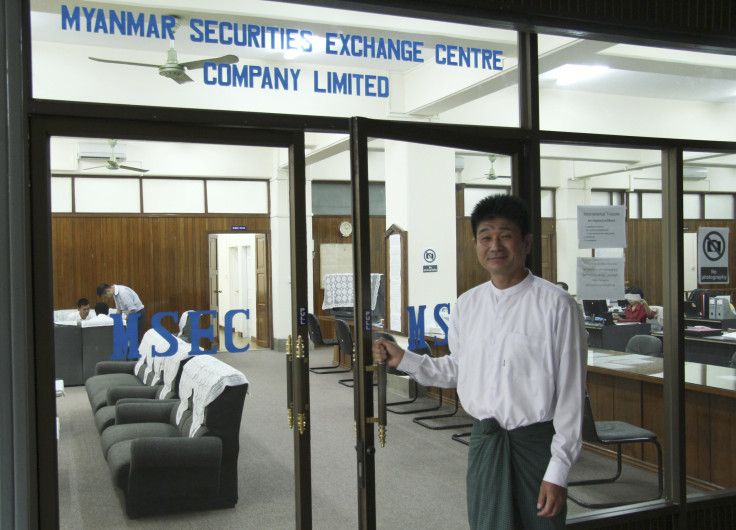Myanmar's Market Capitalization To Reach $15 Billion By 2020, But First It Must Launch Its Stock Exchange

Myanmar's market capitalization could reach about $15 billion by 2020, as foreign investors enter every sector of the Southeast Asian nation. But that number, low compared to many of Myanmar's Southeast Asian neighbors, may still be too ambitious for the impoverished country, as the launch of its stock exchange is already behind schedule, and infrastructure for the majority of the country remains poor.
"Every sector in Myanmar will grow. Some local companies are now the targets for takeovers," said Alisher Ali, managing partner of Silk Road Management and founder of Silk Road Finance. His firm has seen interest from companies in Thailand, Japan, Singapore, South Korea among other nations do to business in Myanmar, according to the Eleven Myanmar, a Myanamr news outlet. "Businesses from energy to food and beverages and property are the backbone of the economy."
The country, which is making great strides owing to its economic and political reforms since 2011, will also cash in on the integration of ASEAN nations, which is expected to be completed by 2015. The corporate sector, in particular, will grow rapidly, Ali said Saturday.
Myanmar’s market capitalization in 2020 would still lag far behind that of its more developed neighbors. Thailand, Malaysia and Singapore, for example, enjoy stock market capitalization of more than $400 billion, according to the Eleven Myanmar. The number is small even compared to multinational conglomerates. The total market capitalization of Yum! Brands, Inc. (NYSE:YUM), which owns KFC, for example, is $32.32 billion, according to the KP Insider.
The stock exchange in Myanmar was originally slated to open by 2015, but delays in getting the legal framework could put the project behind, Bloomberg reported. But it’s important for Myanmar’s development to have the exchange up and running as soon as possible.
“Like any other modern economy, Myanmar needs a capital market to allow companies to raise funds,” said Moe Thuzar, a Singapore-based research fellow at the Institute of Southeast Asian Studies.
Just launching an exchange will not guarantee success, however. The stock exchanges of Laos and Cambodia, two of the poorer nations in the region, saw very little activity since launch in 2011.
There are other issues Myanmar has to iron out before the market becomes established. Most urgently, the nation’s infrastructure is still poor -- its old energy network only reaches a quarter of its 60 million citizens, and is given to frequent power outages, which inevitably hampers the progress of economic development. There is also doubt whether current reform policies will stay past the 2015 presidential election that could see the nation, which until 2011 was ruled by a military regime, change hand once again.
Nonetheless, Myanmar’s future looks bright to many. A recent report from McKinsey & Co. puts the country’s GDP at more than $300 billion by 2030, an enormous leap from the current economy of $45 billion.
© Copyright IBTimes 2024. All rights reserved.





















